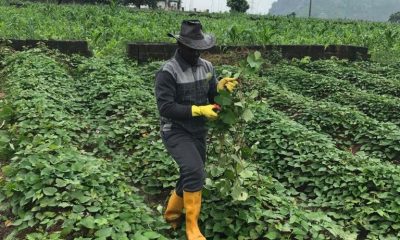Agriculture
Border Closure: Farmers Want Extension by 10 Years

Despite daily increase in prices of commodities in the country, farmers, under the auspices of Agricultural Promotion Organisation of Nigeria (APON), have called for sustenance of boarder closure for 10 years.
The association said the extension of the border closure would encourage, among others, local rice production and increase revenue generation.
At a solidarity rally in support of the border closure at the weekend in Abuja, the farmers said if border policy remained for 10 years, rice production would turn around the country’s agricultural sector of the economy.
With solidarity songs also displayed placards in inscriptions: “Border closure, 80 percent gain, 20 percent loss.
President of the association, Comrade Bashiru Alhassan, while addressing the rally, said they were now producing and making gains in the produce.
“We are happy with the closure of the land border. Farmers now make sales with a lot of products produce and consume by Nigerians. We are here to commend President Muhammadu Buhari for the great achievements.
“We are here to show solidarity with the government and to inform them that the border should remain closed for 10 years”.
Alhassan said there was no longer importation of rice into the country and communities were now producing rice in tones for local consumption and exportation to nearby neighbouring countries.
“Not only rice, cassava and other agricultural products are now being produce in large quantities as a result of the border closure. All the agricultural associations are ready to continue to support the Buhari’s government,” Alhassan added.
Representative of Rice Farmers Association, who is also the chairman Board of Trustees, Agriculture Promotion Organization of Nigeria Comrade Akortsaha Aondohembafan, said the local rice was cheaper and more nutritious than foreign rice.
He said the border closure had stop smuggling and argued that with the reduction in crude oil price at the international market, agricultural produce would help the nation’s Gross Domestic Product (GDP).
“With this closure, there is increase in revenue because local farmers are doing well”, he said and commended the Nigeria Customs Services (NCS) Comptroller-General, Hameed Ali for the initiative.
Recall that although with initial resistance, some Nigerians had kicked against border closure in the guise that prices of commodities would skyrocket.
Closure Gets More Support
One of those prominent Nigerians, who stood by the Federal Government action is the Kwara state Governor, AbdulRahman AbdulRazaq.
AbdulRazaq had hailed the border closure policy, saying regional economic agreements should not be an excuse to dump goods on or compromise the security of the country.
He assured that Kwara state in particular, would continue to support the government policy, including offering necessary supports to the joint security architecture mandated to enforce what the Federal Government said was necessary to check illegal trade, proliferation of small arms and light weapons, and cross border crimes in Nigeria.
“Despite several international agreements Nigeria has entered into, our borders need to be properly secured so that the country does not become a dumping ground for all manners of foreign goods”, AbdulRazaq had said in Ilorin, when a delegation of the Joint Border Operations Drill, North Central Zone, visited him.
Prices of Commodities Soar Daily
Meanwhile, DAILY ASSET monitoring of cost of stable food at the weekend, showed that prices of food items were increasing in daily basis.
At Garki Market, a bag of 50 kilogramme rice, hitherto sold at N9, 500 before the border closure, had risen to N22, 500, just as the price increased to N17, 000 to N18, 000 at the border.
For instance, the Lagos and Kebbi rice, known as Lake Rice, has turned to ‘essential commodity,’ with cost increasing by 22 per cent. Before now, a bag of Lake Rice was sold at N13,500 and a half-bag was N6,500. Presently, a bag costs N16,500, while half a bag goes for N8,000.
However, the price of a 50kg bag of foreign rice has increased by 52 per cent to N22,000 from previous N14,500. For vegetable oil and palm oil the increase is 22 per cent, as 5-litre keg of vegetable oil has moved from N1,800 to N2,200, while a five-litres keg of palm oil has also increased from N1,800 to N2,200 in the market.
Frozen poultry is the most affected in Lagos, as a kilogramme of frozen chicken, which sold for N1,200, now costs N1,600, while a kilogramme of frozen turkey now sells at N1,700. Also, a carton of frozen turkey costs N15,000; one carton of frozen ‘orobo’ chicken, N14,000, while a carton of Nigerian chicken costs N11,500.
Presently, at Mile 12 Market, a basket of tomatoes now costs between N7,000 and N8,000 as against the previous value of N4,000 to N5,000, and the price of pepper has also gone up.
Findings in states where Nigeria shares borders with other countries show that the prices of rice, poultry products, vegetable oil, sugar, beans and even fairly used cloths have risen tremendously.
Although the Federal Government had been encouraging Nigerians to consume local rice to boast local farming, not many local rice are suitable for consumption as a number are said to be sandy.
Agriculture
NNPC Foundation Empowers Vulnerable Farmers in Oyo, Osun

No fewer than 500 farmers on Tuesday benefited from the NNPC Foundation agricultural training initiative for vulnerable farmers in Osun and Oyo States.
The training, marking the flag-off in the South-West zone of Nigeria, was held at the Ilora Baptist Grammar School, Ilora, Oyo State.
The foundation manages the Corporate Social Responsibility (CSR) initiatives of NNPC Limited, focusing on education, health, environment and energy access to communities nationwide.
The Managing Director of the foundation, Mrs Emmanuella Arukwe, said the initiative demonstrated the commitment to food security and economic empowerment for Nigerian farmers.
Arukwe, who was represented by Dr Bala David, the foundation’s Executive Director, Programme Development, said the project aimed to build resilience, boost productivity and promote sustainable agriculture.
“We are training 6,000 farmers across six zones in climate-smart practices, modern techniques, quality inputs, and market access,” she said.
She, therefore, urged farmers to participate actively and embrace the opportunity to help secure Nigeria’s food and economic future.
Mr Olasunkanmi Olaleye, Oyo State Commissioner for Agriculture and Rural Development, commended NNPC Foundation for the training and empowerment programme.
Olaleye, who was represented by Mr Olusegun Ezekiel, the ministry’s Director of Regulation and Enforcement, said empowering vulnerable farmers was crucial in addressing national food security challenges.
He added that the initiative aligned with Oyo State’s agricultural transformation agenda of Gov. Seyi Makinde.
“We remain committed to supporting initiatives that uplift farmers and improve productivity and livelihoods,” Olaleye said.
He encouraged participants to make the most of the training opportunity to improve their practices.
He also called for future collaboration between the foundation and the ministry to achieve greater impact.
The training consultant, Prof. Daniel Ozok, described vulnerable farmers as smallholders with an under-five-hectare farm size, mainly made up of women, youth, and the elderly.
“These farmers are most affected by climate shocks, hence the need for focused training,” Ozok said.
According to him, training equips them with modern techniques and strategies for improved productivity and market access.
Some of the participants expressed gratitude to NNPC Foundation and promised to apply the knowledge gained from the training.
NAN reports that a medical screening exercise was organised by the foundation for participants on the sidelines of the training.
Training initiative would later be held for farmers in Ekiti and Ondo States on a date different from that of Ogun and Lagos States. (NAN)
Agriculture
NNPC Foundation Reiterates Commitment to Ensuring Food Security

The Nigerian National Petroleum Corporation (NNPC) Foundation has renewed its commitment to ensuring food security in the country.
Mrs Emmanuella Arukwe, Managing Director, NNPC Foundation, said this on Wednesday in her remarks during the training of vulnerable farmers in Akwa Ibom.
Arukwe said that 6, 000 farmers across the country would be trained on modern farming methods and market access strategies to boost food production in the country.
Arukwe, who was represented by Dr Bala David, Executive Director, Programme Development and Coordinator, NNPC Foundation, added that the Foundation was dedicated to implementing impactful programmes that aligned with national priorities.
She said that more than 500 farmers in Akwa Ibom were trained by the NNPC Ltd Agricultural Training Initiative for Vulnerable Farmers on modern methods and strategies to boost food production.
Arukwe added that the farmers were drawn from the state’s 31 local government areas to participate in the training to equip them with techniques and market access strategies to add value to their businesses.
“This programme is a testament to our unwavering commitment to food security, economic empowerment and national development.
“As the corporate social responsibility arm of NNPC Ltd, the Foundation is dedicated to implementing impactful programmes that align with national priorities.
“This initiative is part of our broader efforts to support the Federal Government’s agricultural transformation agenda, which seeks to enhance food security, increase productivity, and improve the livelihoods of smallholder farmers.
“Our goal is to equip every participant with the tools, knowledge, and resources needed to transition from subsistence farming to commercial-scale production,” Arukwe said.
In her remarks, Dr Offiong Offor, Commissioner for Agriculture and Rural Development, Akwa Ibom, thanked NNPC for the initiative to equip farmers with knowledge on modern farming.
Offor, represented by Dr Atim Okoko, Permanent Secretary, Ministry of Agriculture and Rural Development, said that a nation that trained farmers was a nation that would not go hungry.
“I want to express the state government’s appreciation to NNPC for mounting this laudable programme.
“A nation that starts to train farmers, a nation that starts to look at farmers will never go hungry.
“In this season that our President Bola Tinubu has come up with his Renewed Hope Agenda, everything is to end hunger in Nigeria,” Offor said.
The commissioner added that the programme came to complement what the state government was doing to ensure food sufficiency.
Responding on behalf of farmers, Mr Bassey Inwang, State Chairman, All Farmers Association of Nigeria (AFAN) said farmers in the state were so grateful for the training.
Inwang said the training would boost food production in the state, as the farmers would apply the knowledge gained on their farms for increase in yields.
He said, “We want to tell you that we will not take this training for granted, we will apply it properly on our farms.” (NAN)
Agriculture
FG Trains 120 Youths On Poultry Farming In Plateau

The Federal Government has commenced free six months training for 120 Plateau youths on poultry farming.
The training is through the National Youth Skills Acquisition Fund (NYESAF), under the Innovation, Development and Effectiveness in the Acquisition of Skills (IDEAS) Project.
Dr Daniel Jarafu, Chief Executive Officer (CEO) VetVille Nigeria Limited, one of federal government’s training service providers in charge of the training, said this on Saturday in Jos, at the flagoff of the programme.
Jarafu, said the project was a deliberate effort by the federal government to empower youths with skills that would make them skillful, self sufficient, employers of labour and in turn, boost economic growth of the nation.
According to him, the six months training is segmented into three months theoretical and three months practical aspects .
He further explained that at the end of the programme the trainees would sit for the National Skills Qualifications (NSQs) examination to earn a national certification which would be equivalent to certification earned in the formal education system.
Earlier, Prof. Arhyel Balami, the Guest of Honour, said the initiative by the federal government was highly laudable as it would lead to the empowerment of youths with hands on agricultural skills that would make them productive with sustainable livelihoods.
Balami, urged the trainees to make the best use of the training by being diligent, showing up and paying rapt attention during the course of the training.
The News Agency of Nigeria (NAN) reports that NYESAF is to train 75,000 youths nationwide, with the aim of enhancing job creation, entrepreneurship, and economic independence among young Nigerians.
NAN further reports that initiative underscores the government’s commitment to equipping youths with essential skills to drive economic growth and self-sufficiency





























